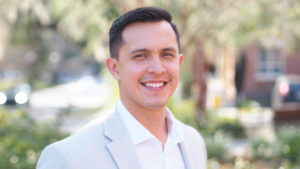Cesar Meza is a doctoral student in the department of Nutrition & Integrative Physiology. Recently, he received a National Institutes of Health (NIH) Ruth L. Kirschstein Predoctoral Fellowship (F31), which is awarded to help doctoral students receive mentored research training while conducting research in the scientific health-related fields. The prestigious award is an honor for any individual, but for Cesar, it meant something extra special. “Receiving the fellowship is especially gratifying as a first-generation college student and Mexican-American scientist,” he says. “It’s been a great feeling overall to receive the award and to know I’m on the right path to achieving my career goals.”

Cesar’s current research examines how body fat influences vascular health and blood glucose control. Researchers have long made the connection between the risk of cardiovascular disease and diabetes and excess body fat, as well as how the regulation of fat metabolism plays a major role in determining how body fat affects overall health. Cesar’s research focuses on the control of fat breakdown by a molecule called NADPH oxidase, which is elevated in people with obesity. “High levels of NADPH oxidase activity are important risk factors not only for cardiovascular diseases but for metabolic disease,” he says. “The concept of NADPH oxidase as a factor controlling fat breakdown is novel and could provide insight into the links between vascular and metabolic dysfunction in obesity.”
The F31 fellowship will help him continue his research, but just as exciting are all the opportunities that the fellowship opens up for Cesar. “The fellowship involves delivering research presentations, attending professional workshops, managing different research projects, and mentoring undergraduate students, in addition to carrying out experiments,” he says. “Through these opportunities, I hope to develop a diverse skill set to make me a competitive applicant for future faculty positions.”
Not only will his fellowship help him land a future faculty job, but Cesar also believes that studying at FSU will also help him achieve his dreams. “I chose FSU because I wanted to conduct rigorous human clinical research on obesity and its health effects. As cardiovascular diseases and type 2 diabetes affect multiple tissues and organ systems, I wanted to study in a department that trained students to examine chronic diseases using integrative approaches,” he says. “Since arriving at FSU and the Department of Nutrition and Integrative Physiology, I have learned research techniques that are only available to a select number of laboratories around the world and obtained training and mentoring from faculty members within my department and the FSU College of Medicine.”
“Since arriving at FSU and the Department of Nutrition and Integrative Physiology, I have learned research techniques that are only available to a select number of laboratories around the world”
“It is highly rewarding to receive an NIH predoctoral fellowship,” he says. “This was a major goal that I set to achieve for my doctoral studies, and I am thankful to have received valuable guidance from my advisor, Dr. Robert Hickner, and my mentoring team in preparation of my proposal.”
Ultimately, Cesar hopes to work in academia and study the relationship between vascular health and metabolic diseases, including how exercise and nutrition can serve as therapies to prevent such diseases.
